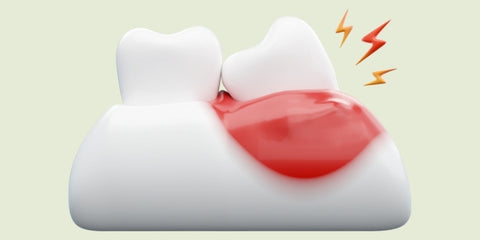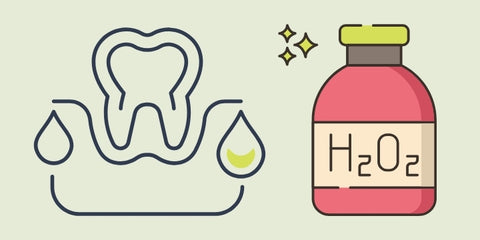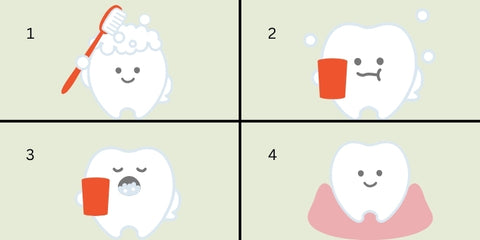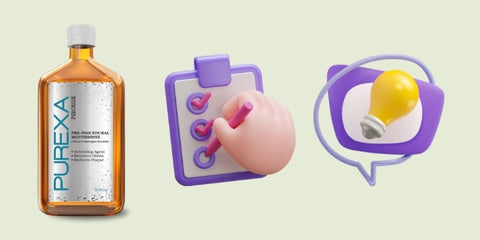Brushing- check, flossing- check, flashing your teeth in the mirror for pure visceral pleasure- check. Oops, wait! Is that blood on your gums? Turns out it is.
You’re lucky if, at this point, you woke up from your nightmare; if not, then this blog is for you.
If this is the first time your gums have bled, then the situation is well under control and you have nothing to feel paranoid about. But if this is a frequent occurrence, then you had better not brush it under the rug.
Bleeding gums are more than often a projection of an underlying dental issue. While the causes behind this may be anything from smoking to gingivitis, it is clear that it cannot be taken lightly.
Your gums swell, turn red, and ultimately trickle down blood, affecting your overall dental health. If not enough caution is exercised from the start, it may lead to serious dental illnesses, causing the gums to pull away from your teeth. Your teeth may even fall out due to being tugged away from their terrain.
Hydrogen peroxide, an elixir in its own right, can kill harmful bacteria that cement around your gumline and break up the plaque, thereby preventing gingivitis. Hydrogen peroxide is no contemporary placeholder; frontline dental professionals have used it since the 1900s to prevent and treat periodontitis.
In this blog, we give you a walkthrough of bleeding gums, the associated dental risks, and how you can combat this problem with simple adjustments in your wellness regime. So hit the pedal and let’s get moving!
Understanding Bleeding Gums

The reason behind bleeding gums can be anything from simple carelessness to complex dental illnesses. If you brush or floss your teeth too hard, it may result in bleeding gums. Similarly, if you don’t clean your teeth twice a day, it could lead to this ordeal.
Here, we look through some common causes of bleeding gums:
- Smoking- Tobacco reduces blood supply to the gums, increasing the risk of adverse oral health effects.
- Plaque- Irregular tooth cleaning may result in bacteria lining up across your gumline, building plaque. When subjected to bacteria, your gums may bleed upon cleaning or flossing.
- Rough flossing or brushing- Applying unwanted pressure or using a hard-bristle toothbrush may also result in bleeding gums. Gentleness must be observed when practising oral hygiene.
- Medications- Certain medications, such as birth control pills, blood thinners, and aspirins, make your gums more susceptible to bleeding.
- Acute stress- Prolonged periods of stress can cause inflammation in different parts of your body, including gums.
- Symptoms of a chronic illness- Leukaemia, deficiency of Vitamin C and K, gingivitis, or periodontitis—may leave your gums bleeding as a general symptom.
- Hormonal changes- Hormonal changes, especially during pregnancy, can cause the gums to bleed.
Advanced gum diseases can sometimes manifest themselves through bleeding gums. Gingivitis can cause your gums to swell and bleed. When identified at an initial stage, it can be nipped in the bud through good dental care practices. However, it is always advisable to consult with a dental care professional.
Gingivitis, when left untreated, assumes the form of periodontitis. A serious infection, periodontitis can destroy the soft tissue around teeth. Therefore, it is important to recognise the symptoms beforehand and keep your oral health in check.
Hydrogen Peroxide for Bleeding Gums

A neat solution, patronised by dental health professionals and household remedy practitioners alike, is the use of hydrogen peroxide for promoting good oral care.
Hydrogen peroxide works as a disinfectant to get you rid of the stubborn bacteria that coat your teeth. It removes that sticky film and promotes gum health. Rinse your mouth with hydrogen peroxide and spit the froth out once you’re finished brushing your teeth. Care should be taken to not swallow the solution.
Hydrogen peroxide is effective against all forms of microorganisms, including dormant forms with known high resistance, such as bacterial spores and protozoal cysts.
A topical antiseptic, it can kill pathogens through oxidation bursts and local oxygen production.
Also Read - A Comprehensive Guide to Gargling Hydrogen Peroxide for Tonsillitis and Beyond
Hydrogen peroxide can help with bleeding gums by:
- Removing plaque- Hydrogen peroxide can help remove plaque, which is the main cause of bleeding gums. It kills harmful bacteria, thereby cutting down the formation of plaque
- Killing bacteria- Hydrogen peroxide can kill harmful bacteria. It releases oxygen, which destroys the greasy biofilm terrorising your mouth.
- Reducing swelling- A hydrogen peroxide rinse can help reduce swelling and bleeding in gums.
- Mitigating inflammation- A 2012 review of studies found that gargling with hydrogen peroxide can help reduce gum inflammation when used alongside regular brushing and flossing.
Step-by-Step Guide to Using Hydrogen Peroxide for Bleeding Gums

Here is how you can put hydrogen peroxide to the job of alleviating your bleeding gums:
- Take a 3% concentration of hydrogen peroxide. Anything stronger than this can put your gums at risk of inflammation.
- Mix one part hydrogen peroxide with three parts water. This blend is necessary to create a functional and safe mixture
- Take a small mouthful of the mixture and tilt your head back as you gargle.
- Swish the mixture around in your mouth for 60 seconds.
- Spit out the mixture.
- Rinse your mouth thoroughly every time you use hydrogen peroxide.
Never swallow your peroxide rinse, no matter the concentration. Gargling with undiluted hydrogen peroxide can lead to chemical burns in the mouth and throat, severe irritation of the oral tissues, abdominal pain, and vomiting if swallowed.
Never use food-grade hydrogen peroxide to gargle since it contains more than 35% concentration.
Precautions and tips

Hydrogen peroxide, a common commodity used for ensuring dental health and wellness, must be used with due diligence and often in conjunction with dental consultation.
When properly used, over-the-counter oral care products containing small amounts of hydrogen peroxide are both safe and effective. Higher concentrations are safe when administered by a dental professional.
Before attempting to create your mixture, consult your dentist. Although hydrogen peroxide is readily available and affordable, ensuring a safe concentration at home can be challenging. Ill-fitting mouth guards may cause irritation or sensitivity if the mixture overflows or contacts exposed tooth roots.
Ingestion of any amount should be strictly avoided. Symptoms of poisoning include abdominal pain, breathing difficulties, burns, seizures, and vomiting. Your dental professional can recommend safe products and usage tailored to your needs.
Additional tips for maintaining overall oral health.
These simple tips can be practiced on an ongoing basis as part of your regular oral healthcare cycle to reduce gum bleeding or, better- stave off the situation altogether.
- Maintain good oral hygiene by brushing your teeth at least twice daily and flossing once a day to prevent plaque buildup, which can lead to gum disease.
- Rinse your mouth with hydrogen peroxide after brushing to help remove plaque and promote gum health. Avoid swallowing the solution.
- Quit smoking to improve gum health and reduce the risk of gum disease, as smoking weakens the immune system and makes it harder for the body to fight off plaque bacteria.
- Manage stress levels to prevent potential negative effects on the immune system, which could contribute to gum infections and plaque accumulation.
- Increase your intake of vitamin C-rich foods to strengthen the immune system and combat gum infections.
- Consider adding vitamin K-rich foods to your diet or taking a supplement to support blood clotting and reduce gum bleeding.
- Apply a cold compress to reduce gum swelling and restrict blood flow.
- Carbohydrates and sugary foods encourage bacterial growth. Limit carbohydrate intake to improve gum health and prevent plaque formation.
- Drink green tea daily to reduce inflammation in the mouth and improve periodontal health, as it contains antioxidants that can combat bacteria.
- Rinse your mouth with warm salt water several times a day to reduce bacteria and inflammation.
Remember to consult a dentist if gum bleeding persists for more than 7 to 10 days, and maintain a consistent oral hygiene routine with proper brushing, toothpaste selection, toothbrush replacement, and dental flossing.
Suggested read - How does aloe vera help with dental problems?
Conclusion
The root of every major dental problem boils down to the carelessness with which you approach oral wellness. A simple practice of brushing your teeth twice daily and flossing without fail can help you avoid advanced gum-related diseases in the long fame.
The importance of hydrogen peroxide in fighting off biofilm and preventing gum bleeding cannot be emphasised enough. A 3% concentration of hydrogen peroxide with thrice the amount of water is enough to get the parasites to evacuate your mouth.
Hydrogen peroxide breaks the plaque inside your mouth and the fleet of bacteria building it by releasing oxygen. Rebounding from gingivitis is an easy feat but if it moves on to the next stage, the infection becomes permanent, a condition known as periodontitis.
A host of simple dental practices highlighted above can help you keep a lid on your gum health.
However, it’s important to realise that nothing can substitute for professional consultation. Diet, exercise, stress levels, deficiency, addiction etc. are unique to every person, and treatment for any gum disease should take into account the variables of each case. Only a good dentist can lay out a comprehensive plan of action that can be exercised to achieve the results.
So if your gums bleed perpetually and home remedies are of no help in solving your troubles, go visit a reliable dentist and put yourself on a plan to reclaim your oral hygiene.
Written by Dr. Shipra Jaiswal, BDS, MDS, a Periodontist and Gums Specialist